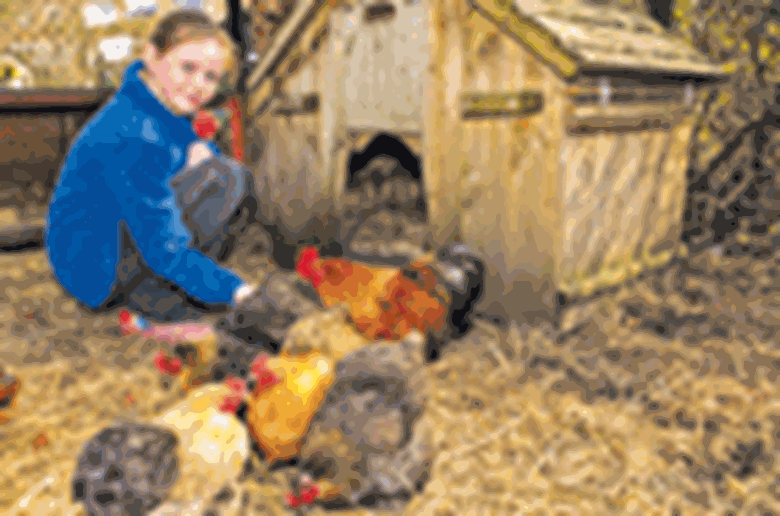Enabling Environments: Pets - Four-legged friends
Lynne Coxell
Friday, July 6, 2012
A menagerie of pets is bringing joy and learning benefits to the children of St Edward's C of E School in Rochdale, says head teacher Lynne Coxell.

While most children have to head for the beach for a donkey ride, our pupils have only to go to the playground and school field to enjoy a ride on Maco or Joop, two rescue donkeys and the latest additions to St Edward's menagerie of pets.
Half-brothers Maco, 15, and Joop, 16, arrived from Sidmouth Donkey Sanctuary last August and join our:
- two micro pigs
- five pygmy goats - including two kids bred at the school
- chickens - the children collect their eggs to use in our kitchen for lunches
- bantams - we breed with these and use their eggs
- rabbits - they have just had seven babies
- guinea pigs

- chinchillas
- two bearded dragons, with babies, and
- 18 coy carp that live in the pond in the school grounds.
Our pupils are responsible for all aspects of the animals' care, including grooming, walking and mucking them out. The donkeys are the responsibility of various Key Stage 2 children, under the watchful eye of an adult, although pupils throughout the school can book a ride at the weekly Donkey Club and also help to groom and feed them.
Reception class children look after micro pigs Peppa and Wibbly. As full-time class members, the pigs are free to mingle with the children and have free-flow access to the outdoors. Far from being a distraction, the pigs are a calming influence on the children - just one of the many benefits that our pets have brought to our children since we started introducing them seven years ago.
St Edward's serves a varied socio-economic population that has experienced its fair share of hardship in recent years due to the closure of many factories in the area. Generally, we find our pets:
- enhance children's learning and improve outcomes
- give children real enjoyment
- help our children to develop empathy and become more caring (This is certainly true of the reception class children who are much more gentle and nurturing since Peppa and Wibbly moved in.)
- have a positive impact on children's behaviour (Our pupils understand that they can't be loud or boisterous around the pets.)
- increase children's motivation to come to school
- help children to acquire life skills
- build children's confidence
- provide the children with a sense of responsibility and ownership, and
- have influenced children's plans for the future, with some wanting to work in animal husbandry.
SEAL OF APPROVAL
The RSPCA generally discourages schools from keeping pets, seeing them as noisy and frightening places for animals. When we introduced pets into school, we started with smaller animals and, before they arrived, made sure the children knew how to care and behave around them. 
Our animals are checked by welfare officers every three months and they say our animals couldn't be better looked after. Our work with animals has also had the seal of approval from RSPCA officers who have visited the school.
While Thumper the rabbit was found abandoned in a teacher's garden, many of the school's pets come from rescue centres and the chickens came from battery farms.
Introducing donkeys, pigs and goats to the school was the decision of three classes of Year 6 pupils, who are awarded a sum of money annually to spend on their legacy to the school and invited to return in Year 7 to see the results of their project.
The classes that decided to introduce a new animal carried out a huge amount of research beforehand, making sure that the school was able to afford and care for the new pet.
WIDER AIMS
Looking after the animals links well with the school's wider aim for our children to become self-aware learners, with the resilience and reflectiveness to develop and constantly build on the habits of a successful learner.
It fits too with our commitment to raise our children's awareness of ecology and the need to protect our environment. As an eco-school (see box), we embed issues of sustainability in our school curriculum and many lessons are taught outside. The children also undertake regular monitoring of our energy use, recycle waste and get involved in litter pick-ups.
A year ago, the DfE appointed us as an ambassador eco-school and we have now showcased our work to more than 70 other schools. We also work with schools' eco-committees to do joint lessons, have a partnership with a school in South Africa and plan to become a Fairtrade School.
Lynne Coxell spoke to Ruth Thomson
MORE INFORMATION
- Details of St Edward's Primary School and its various initiatives are at: http://clc2.uniservity.com/Grouphomepage.asp?GroupId= 392838
- www.eco-schools.org.uk
- www.fairtrade.org.uk/schools
ECO-SCHOOLS
Eco-Schools is an international award programme aimed at embedding the principles of sustainability into the heart of school life.
On registering free at www.eco-schools.net, schools follow a seven-step process aimed at addressing a variety of environmental themes: water, biodiversity, energy, global perspectives, healthy living, litter, school grounds, transport and waste.
The programme is child-driven, with children leading the school's eco-committee, consulting with fellow pupils on priorities and initiatives and helping to audit the effectiveness of the measures that they have taken. They can also make contact with other schools involved in the programme.




